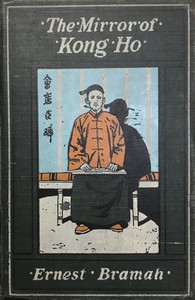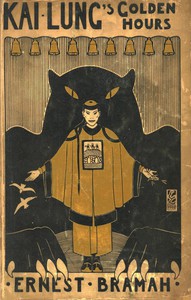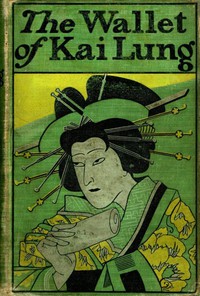The Mirror of Kong Ho by Ernest Bramah (big screen ebook reader .TXT) 📗

- Author: Ernest Bramah
Book online «The Mirror of Kong Ho by Ernest Bramah (big screen ebook reader .TXT) 📗». Author Ernest Bramah
Let it here be openly confessed that the intricately-arranged titles used among these islanders, and the widely-varying dignities which they convey, have never ceased to embarrass my greetings on all occasions, and even yet, when a more crystal insight into their strangely illogical manners enables me not only to understand them clearly myself, but also to expound their significance to others, a necessary reticence is blended with my most profuse cordiality, and my salutations to one whom I am for the first time encountering are now so irreproachably balanced, that I can imperceptibly develop them into an engaging effusion, or, without actual offence, draw back into a condition of unapproachable exclusiveness as the necessity may arise. With us, O my immaculate sire, a yellow silk umbrella has for three thousand years denoted a fixed and recognisable title. A mandarin of the sixth degree need not hesitate to mingle on terms of assured equality with other mandarins of the sixth degree, and without any guide beyond a seemly instinct he perceives the reasonableness of assuming a deferential obsequiousness before a mandarin of the fifth rank, and a counterbalancing arrogance when in the society of an official who has only risen to the seventh degree, thus conforming to that essential principle of harmonious intercourse, “Remember that Chang Chow’s ceiling is Tong Wi’s floor”; but who shall walk with even footsteps in a land where the most degraded may legally bear the same distinguished name as that of the enlightened sovereign himself, where the admittedly difficult but even more purposeless achievement of causing a gold mine to float is held to be more praiseworthy than to pass a competitive examination or to compose a poem of inimitable brilliance, and where one wearing gilt buttons and an emblem in his hat proves upon ingratiating approach not to be a powerful official but a covetous and illiterate slave of inferior rank? Thus, through their own narrow-minded inconsistencies, even the most ceremoniously-proficient may at times present an ill-balanced attitude. This, without reproach to himself, concerns the inward cause whereby the one who is placed to you in the relation of an affectionate and ever-resourceful son found unexpectedly that he had lost the benignant full face of a lady of exalted title.
At that time I had formed the acquaintance, in an obscure quarter of the city, of one who wore a uniform, and was addressed on all sides as the commander of a band, while the gold letters upon the neck part of his outer garment inevitably suggested that he had borne an honourable share in the recent campaign in a distant land. As I had frequently met many of similar rank drinking tea at the house of the engaging countess to whom I have alluded, I did not hesitate to prevail upon this Captain Miggs to accompany me there upon an occasion also, assuring him of equality and a sympathetic reception; but from the moment of our arrival the attitudes of those around pointed to the existence of some unpropitious barrier invisible to me, and when the one with whom I was associated took up an unassailable position upon the central table, and began to speak authoritatively upon the subject of The Virtues, the unenviable condition of the proud and affluent, and the myriads of fire-demons certainly laying in wait for those who partook of spiced tea and rich foods in the afternoon, and did not wear a uniform similar to his own, I began to recognise that the selection had been inauspiciously arranged. Upon taxing some around with the discrepancy (as there seemed to be no more dignified way of evading the responsibility), they were unable to contend against me that there were, indeed, two, if not more, distinct varieties of those bearing the rank of captain, and that they themselves belonged to an entirely different camp, wearing another dress, and possessing no authority to display the symbol of the letters S.A. upon their necks. With this admission I was content to leave the matter, in no way accusing them of actual duplicity, yet so withdrawing that any of unprejudiced standing could not fail to carry away the impression that I had been the victim of an unworthy artifice, and had been lured into their society by the pretext that they were other than what they really were.
With the bitter-flavoured memory of this, and other in no way dissimilar episodes, lingering in my throat, it need not be a matter of conjecture that for a time I greeted warily all who bore a title, a mark of rank, or any similar appendage; who wore a uniform, weapon, brass helmet, jewelled crown, coat of distinctive colour, or any excessive superfluity of pearl or metal buttons; who went forth surrounded by a retinue, sat publicly in a chair or allegorical chariot, spoke loudly in the highways and places in a tone of official pronouncement, displayed any feather, emblem, inscribed badge, or printed announcement upon a pole, or in any way conducted themselves in what we should esteem to be fitting to a position of high dignity. From this arose the absence of outward enthusiasm with which I at first received Sir Philip’s extended favour; for although I had come to distrust all the reasonable signs of established power, I distrusted, to a much more enhanced degree, their complete absence; and when I observed that the one in question was never accompanied by a band of musicians or flower-strewers, that he mingled as though on terms of familiar intercourse with the ordinary passers-by in the streets, and never struck aside those who chanced to impede his progress, and that he actually preferred those of low condition to approach him on their feet, rather than in the more becoming attitude of unconditional prostration, I reasoned with myself whether indeed he could consistently be a person of well-established authority, or whether I was not being again led away from my self-satisfaction by another obliquity of barbarian logic. It was for this reason that I now welcomed the admitted power which he has of incriminating persons in a variety of punishable offences, and I perceived with an added satisfaction that here, where this privilege is more fully understood, few meet him without raising their hands to the upper part of their heads in token of unquestioning submission; or, as one would interpret the symbolism into actual words, meaning, “Thus, from this point to the underneath part of our sandals, all between lies in the hollow of your comprehensive hand.”
There is a written jest among another barbarian nation that these among whom I am tarrying, being by nature a people who take their pleasures tragically, when they rise in the morning say, one to another, “Come, behold; it is raining again as usual; let us go out and kill somebody.” Undoubtedly the pointed end of this adroit-witted saying may be found in the circumstance that it is, indeed, as the proverb aptly claims, raining on practically every occasion in life; while, to complete the comparison, for many dynasties past this nation has been successfully engaged in killing people (in order to promote their ultimate benefit through a momentary inconvenience,) in every part of the world. Thus the lines of parallel thought maintain a harmonious balance beyond the general analogy of their sayings; but beneath this may be found an even subtler edge, for in order to inure themselves to the requirement of a high destiny their various games and manners of disportment are, with a set purpose, so rigorously contested that in their progress most of the weak and inefficient are opportunely exterminated.
There is a favourite and well-attended display wherein two opposing bands, each clad in robes of a distinctive colour, stand in extended lines of mutual defiance, and at a signal impetuously engage. The design of each is by force or guile to draw their opponents into an unfavourable position before an arch of upright posts, and then surging irresistibly forward, to carry them beyond the limit and hurl them to the ground. Those who successfully inflict this humiliation upon their adversaries until they are incapable of further resistance are hailed victorious, and sinking into a graceful attitude receive each a golden cup from the magnanimous hands of a maiden chose to the service, either on account of her peerless outline, the dignified position of her House, or (should these incentives be obviously wanting,) because the chief ones of her family are in the habit of contributing unstintingly to the equipment of the triumphal band. There is also another kind of strife, differing in its essentials only so far that all who engage therein are provided with a curved staff, with which they may dexterously draw their antagonists beyond the limits, or, should they fail to defend themselves adequately, break the smaller bones of their ankles. But this form of encounter, despite the use of these weapons, is really less fatal than the other, for it is not a permissible act to club an antagonist resentfully about the head with the staff, nor yet even to thrust it rigidly against his middle body. From this moderation the public countenance extended to the curved-pole game is contemptibly meagre when viewed by the side of the overwhelming multitudes which pour along every channel in order to witness a more than usually desperate trial of the hurl-headlong variety (the sight, indeed, being as attractive to these pale, blood-thirsty foreigners as an unusually large execution is with us), and as a consequence the former is little reputed save among maidens, the feeble, and those of timorous instincts.
Thus positioned, regarding a knowledge of their outside amusements, it has always been one of the most prominent ambitions of this person’s strategy to avoid being drawn into any encounter. At the same time, the thought that the maidens of the household here (of whom there are several, all so attractively proportioned that to compare them in a spirit of definite preference would be distastefully presumptuous to this person,) should regard me as one lacking in a sufficient display of violence was not fragrant to my sense of refinement; so that when Sir Philip, a little time after our arrival, related to me that on the following day he and a chosen band were to be engaged in the match of a cricket game against adversaries from the village, and asked whether I cared to bear a part in the strife, I grasped the muscles of the upper part of my left arm with my right hand—as I had frequently seen the hardy and virile do when the subject of their powers had been raised questioningly—and replied that I had long concealed an insatiable wish to take such a part at a point where the conflict would be the most revengefully contested.
Being thus inflexibly committed it became very necessary to arrange a well-timed intervention (whether in the nature of bodily disorder, fire, or demoniacal upheaval, a warning omen, or the death of some of our chief antagonists), but before doing so I was desirous of understanding how this contest, which had hitherto remained outside my experience, was waged.
There is here one of benevolent rotundity in whose authority lie the cavernous stores beneath the house and the vessels of gold and silver; of menial rank admittedly, yet exacting a seemly deference from all by the rich urbanity of his voice and the dignity of his massive proportions. In the affable condescension of his tone, and the discriminating encouragement of his attitude towards me on all occasions, I have read a sympathetic concern over my welfare. Him I now approached, and taking him aside, I first questioned him flatteringly about his age and the extent of his yearly recompense, and then casually inquired what in his language he would describe the nature of a cricket to be.
“A cricket?” repeated the obliging person readily; “a cricket, sir, is a hinsect. Something, I take it, after the manner of a grass-’opper.”
“Truly,” I agreed. “It is aptly likened. And, to continue the simile, a game cricket—?”
“A game





Comments (0)